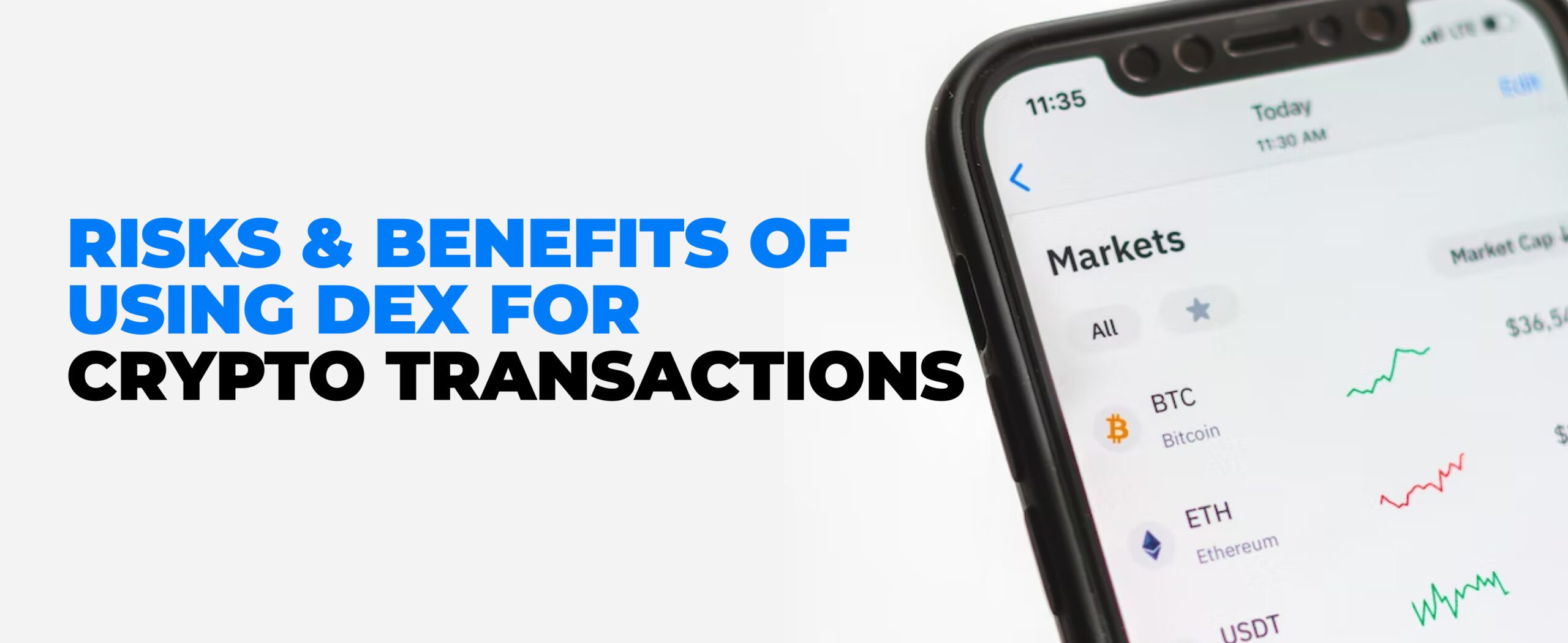
Risks & Benefits of Using Decentralized Exchanges for Crypto Transactions
Exchanges are vital to the crypto industry because they enable users to access various cryptocurrencies as well as send, receive, and swap tokens. There are three main types of crypto exchanges and one of them is the decentralized exchange (DEX).
If you’re new to the crypto realm, let’s discuss the benefits and potential risks of using DEX to help you determine if it’s the right type of exchange for you.
What Is a DEX?
A DEX is a type of crypto exchange that operates on a decentralized network, without any central authority overseeing its activities. Therefore, DEX users can directly buy and sell cryptocurrencies with one another.
Unlike centralized exchanges (CEXs), which are run by a single organization and hold user funds and private keys, DEXs allow users to control their own funds and assets.
How Does a DEX Work?
DEXs use smart contracts and blockchain technology to enable peer-to-peer (P2P) transactions without the need for intermediaries. They use a network of nodes to facilitate trades and verify transactions.
Users on a DEX connect their digital wallets to the network and trade cryptocurrencies directly with other users on the platform. Transactions are executed through smart contracts, which are self-executing programs that automatically execute trades once certain conditions are met.
What Are the Benefits of Using DEX?
The benefits of using DEXs include, but are not limited to, the following:
- Security
DEXs have heightened security and transparency compared to CEXs. The former’s lack of centralization makes it difficult for it to be hacked, and users have greater protection against fraud and theft.
In addition, DEX utilizes smart contracts, which are self-executing and irreversible agreements between parties, which further enhances security measures.
- Greater privacy
A DEX does not require users to provide personal information to make crypto transactions. This means that users can remain anonymous and protect their privacy while using the exchange. At the same time, DEXs do not have a central point of control, which makes it more difficult for third parties to monitor or track user activity.
- Token availability
DEXs allow any token minted on the blockchain they operate on, meaning new projects are more likely to list on these exchanges before appearing on centralized counterparts.
- Greater control of one’s funds
On a DEX, users hold their private keys and have sole access to their wallets. Additionally, users can trade directly with each other on a DEX, eliminating the need for a middleman to hold and execute trades on their behalf, further increasing control and security over their funds.
What Are the Risks of Using DEX?
Some of the risks of using a DEX for crypto transactions include:
- Smart contract vulnerabilities
DEXs rely on smart contracts that are publicly accessible and audited by reputable firms to ensure their security. While audits can help prevent exploits, it is still possible for bugs to go unnoticed and cause potential harm to liquidity providers. This highlights the need for continuous monitoring and improvement of DEXs to ensure the safety of users’ funds.
- Anyone can list tokens, even scams
Since DEXs allow anyone to list a new token, this may also increase the risk of users’ exposure to scam tokens. To avoid such scams, traders should conduct due diligence before buying by researching the token through its white paper, joining its community on social media, and looking for potential audits on the project. Such actions can help prevent scammers from taking advantage of unsuspecting users.
Some DEXs also require users to verify the smart contract of the tokens they wish to buy to counter these risks.
- Requires knowledge to use them
Using a DEX requires knowledge of crypto wallets and security measures to keep funds safe. These wallets must be funded with the correct tokens for each network, which can be challenging for those who lack specific knowledge or are new to crypto. Adjusting slippage tolerance and avoiding errors such as withdrawing coins to the wrong network or overpaying transaction fees can also be difficult for inexperienced users. All of these factors can lead to a loss of funds if not properly understood and managed.
Wrapping Up
DEXs provide an alternative for crypto users who prioritize security, control, and privacy. And while DEXs offer advantages such as greater security through smart contracts, greater control over one’s funds, and greater privacy, they also come with risks such as the possibility of scams and potential technical difficulties for less experienced users. Be sure to conduct proper due diligence before making any transactions.
